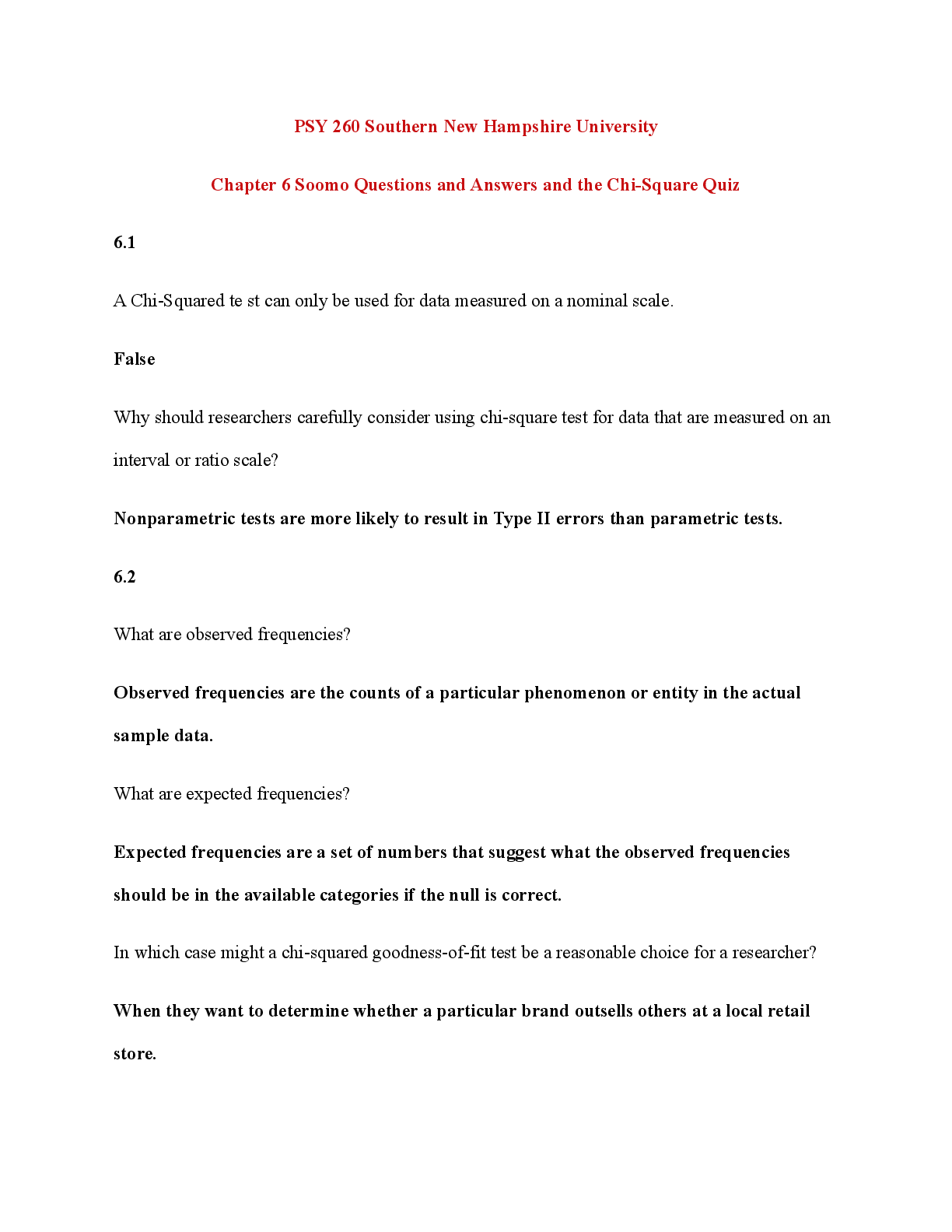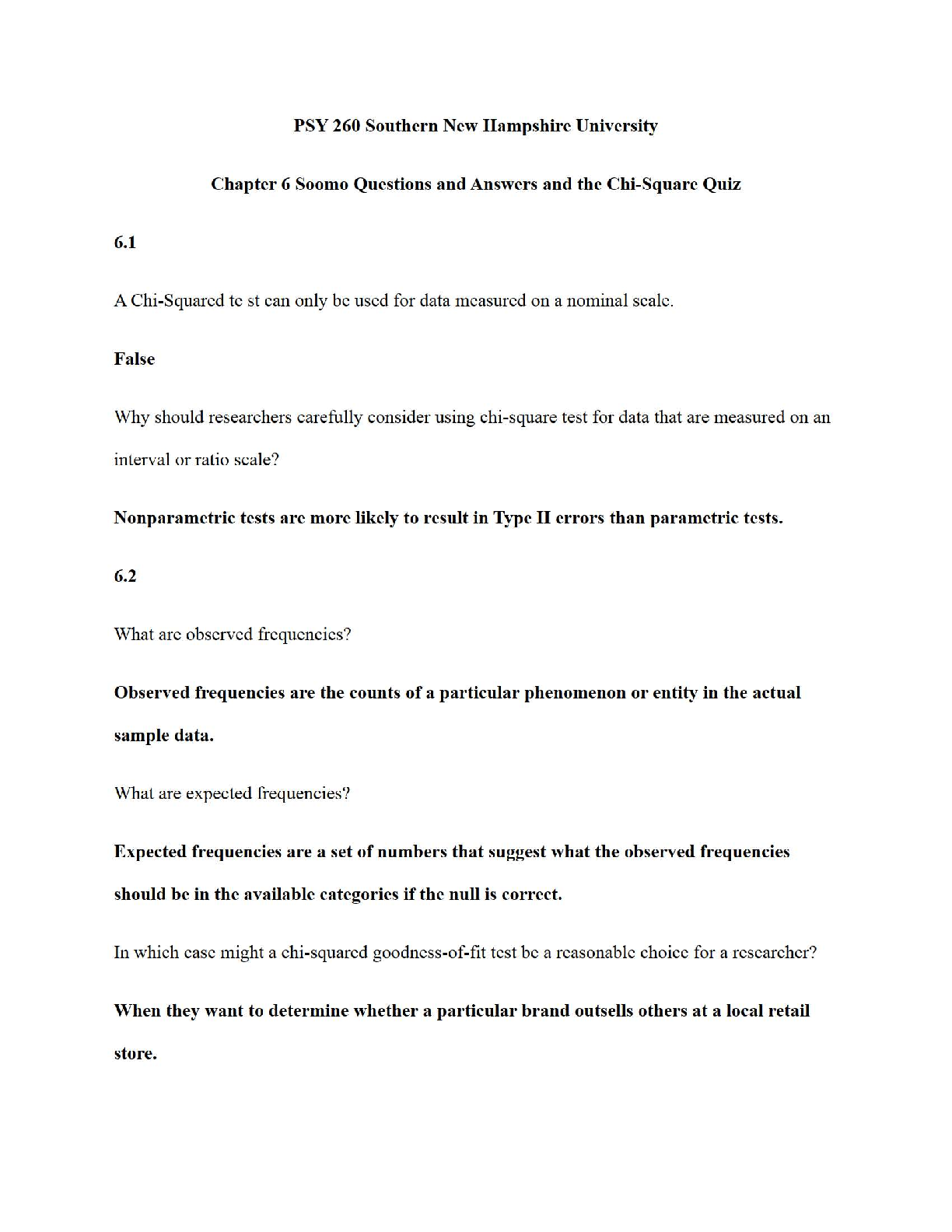History > STUDY GUIDE > Southern New Hampshire University - HIS 1_ US History 1 (Test bank study guide) Fall 2020. (All)
Southern New Hampshire University - HIS 1_ US History 1 (Test bank study guide) Fall 2020.
Document Content and Description Below
History The study of the past Bias Prejudice towards one event, group of people, or set of objects when compared to another Objective History Accounts of the past that do not take the historian�... �s personal views into account; unbiased history Historiography The study and interpretation of historical writings Social History The history of the average person, especially in terms of demographic groups Reconstruction The period following the Civil War in which the southern states were reintegrated into the Union Social History The history of the average person, especially in terms of demographic groupsPrimary Source First-hand accounts and other evidence from the time period that a historian is studying or writing about Secondary Source An analysis of primary sources related to past events How to read a primary source "Five Ws" (and one "H"): • Who created this source? Who is it about? Who is the audience? • What’s going on in the source? What’s the purpose? • Where was it created or presented? • When was it created? • Why does this source exist? • How is this source constructed? Does the ordering of the ideas tell you anything about points it may be trying to make? Militant Abolitionism Movement that demanded complete and immediate elimination of slavery from the United States, on moral groundsCritical Thinking Clear, self-directed, and evidence-based judgment on a topic Five C’s Change Over Time: History happens over a period of time. During any given period of time, people, events, and ideas can change. Context: Think about primary sources in terms of their greater context. Nothing you read from the past was created in a vacuum, but in a social, cultural, economic, or political setting different from today. Causality: All events have a cause and an effect. Before the first shot of the Civil War was fired, a long history of conflict and debate set the stage. Primary sources are subject to the law of cause and effect. Contingency: Everything is related. Like Context and Causality, historians understand that nothing happens in isolation. Historians think about the ways in which a primary source is related to other primary sources, making connections between multiple pieces of evidence and historical scenarios. Complexity: We live in a complex world. For example, no single cause started the Revolutionary War. Historians understand this and create historical narratives that reflect a world of different meanings and perspectives.Capitalism An economic system based on the investment and accumulation of capital to facilitate the production and exchange of goods through market, price-driven relations Class The structuring of human society in terms of economic position and status Gender The social and/or cultural vision of what it means to be male or female Historical Lens The analytical approach that a historian may take when interpreting and creating narratives about the past Race The classification of humans into groups based on skin color or other physical characteristics and featuresAssimilation The processes by which a people or individual persons adopt the features of the dominant culture Carlisle Indian Industrial Training School Among the most notable boarding schools that aimed to “civilize” Indian children during the late nineteenth and early twentieth centuries Dawes Act Authorized the federal government to break up reservation lands into individual allotments to be distributed among Indian families; remaining reservation lands would become available for white settlement Indian Wars A series of armed conflicts between the United States and various western Native American tribes during the mid- to late-nineteenth century Chief Joseph Leader of the Nez Perce tribe, who led a group of approximately 800 Nez Perce Indians in an attempt to evade capture by the U.S. military and flee to Canada Sitting Bull Sioux tribal leader who united Plains Indians in resisting the U.S. military during the Indian Wars; he defeated General Custer at the Battle of Little Bighorn, and was killed in 1890 by tribal policeDe Jure Segregation Instances where racial segregation, or the separation of people for racial reasons, was sanctioned by law (de jure) Jim Crow A system of laws and social codes designed to regulate and monitor the physical and social segregation of whites and blacks in the post-Reconstruction South in an effort to codify white supremacy Lynchings Public hangings, oftentimes of African-American men by vigilante white mobs, for perceived offenses or challenges to white supremacy Plessy v. Ferguson (1896) Supreme Court case that affirmed the doctrine of “separate but equal” in public accommodations Redeemers Democrats opposed to Congressional Reconstruction; the label expressed their desire to “redeem” the southern states from Republican control and to restore a pre-Civil War social orderSharecropping A system in which poor black and white farmers paid rent on land they farmed (but did not own) with the crops they grew “New South” A belief that the South could embrace a modern, diversified economy based on industry and agriculture that, in the process, would resolve the region’s racial problems The Slaughterhouse Cases (1873) Butchers from Louisiana claimed that their exclusion from a state-sponsored monopoly violated the “equal protection” clause of the Fourteenth Amendment. The court disagreed, arguing that the Fourteenth Amendment should be understood narrowly as protecting citizens from state actions that violated their "federal rights," but that states could otherwise discriminate as they saw fit. United States v. Cruikshank (1876) Following an event known as the Colfax Massacre, in which whites affiliated with the Democratic Party killed approximately 150 former slaves in Colfax, Louisiana after a close gubernatorial election, a federal court convicted several of the individuals responsible for the attack. In 1876, however, the Supreme Court threw out most of the convictions, based on a narrow interpretation of the Fourteenth Amendment. It argued that obligation to enforce "equal protection" of Constitutional rights (such as the right to assembly) rested with the states, not the federal government.The Civil Rights Cases (1883) The Supreme Court declared the Civil Rights Act of 1875 unconstitutional on the grounds that it infringed upon the rights of private businesses. According to the court’s ruling, state entities were bound to the Fourteenth Amendment’s “equal protection” clause, but private businesses were not. Poll taxes A poll tax was a fee that every citizen had to pay for the right to vote. This tax virtually guaranteed that only those who had the money to pay the fee (like planters, businessmen, and merchants) would vote. Literacy tests and “understanding” clauses These tests required prospective voters to read and, in some cases, interpret a passage from the state constitution before a voting registrar. Grandfather clauses A “grandfather clause” exempted anyone descended from persons who had been eligible to vote before the Civil War from poll taxes, literacy tests, or any other voting requirement. African Americans did not qualify for this exemption, since only white men could vote in the South prior to the Civil War. Bonanza Farms Large farms owned by speculators who hired laborers to work the landExodusters African-Americans homesteaders who migrated from the South to Kansas in order to escape racial violence and find economic opportunity Homestead Act Promoted western settlement by granting free land to heads of households who promised to improve the land Manifest Destiny The phrase that came to stand for the idea that white Americans had a calling and a duty to seize and settle in western North AmericaGhost Dance A religious revitalization movement initiated by the prophet Wavoka that swept across many western Indian reservations by 1890 Wounded Knee Massacre The killing of approximately 150 Sioux Indians by the U.S. military in South Dakota on December 29, 1890 Frederick Jackson Turner Late-19th century historian who argued for the significance of the frontier to the development of American democracy and Ammuerican identityHolding Company A central corporate entity that controls the operations of multiple companies by holding the majority of stock for each enterprise Horizontal Integration Method of growth wherein a company merges with or otherwise acquires similar companies to reduce competition and consolidate control of a market Monopoly The ownership or control of all enterprises comprising an entire industry Pools Voluntary agreements that divided up markets among competing companies and set up prices Robber Barons A negative term for businessmen who made their fortunes in the massive railroad boom of the late nineteenth century Trust A legal arrangement where a small group of trustees have legal ownership of a business that they operate for the benefit of other investorsVertical Integration Method of growth wherein a company acquires other companies to control all aspects of the production process, from the processing of raw materials to the manufacturing of the final product Andrew Carnegie Scottish-American industrialist who made his fortune in the steel industry by applying the tactic of vertical integration; later became a noted philanthropist Jay Gould A prominent railroad magnate who owned the Union Pacific Railroad( that helped to construct the first transcontinental railroad line) and built significant personal wealth by the late 19th century John D. Rockefeller A ruthless businessman and founder of Standard Oil Company who used horizontal integration and trusts to consolidate control of the oil market and become one of the wealthiest men in the late 19th century Mail-Order Catalogs Enabled rural Americans to place orders for goods manufactured in urban centersGilded Age A period in American history during which materialism, a quest for personal gain, and corruption dominated both politics and society Gospel of Wealth The idea that business leaders should be philanthropists and serve as benefactors to those less fortunate in order to advance American society Self-Made Man A person born in a disadvantaged situation who, nevertheless, rises through the ranks of society through hard work and ingenuity Social Darwinism Theorized that human societies evolved much like a natural organism, wherein some individuals succeeded due to inherent racial and ethnic traits or through their ability to adapt Charles Darwin British naturalist who, in his 1859 work On the Origin of Species, made the case that species develop and evolve through natural selection instead of divine interventionEdward Bellamy American novelist skeptical of the industrial progress of the Gilded Ae; his 1888 novel Looking Backward, 2000-1887, portrayed a futuristic America where citizens lived in peace and harmony with each other after abandoning industrial capitalism Henry George Economist whose 1879 book Progress and Poverty criticized the inequality found in the industrial economy Herbert Spencer British political philosopher who took Darwin’s theory of natural selection to explain society; he coined the phrase “survival of the fittest” and helping to popularize the concept of social Darwinism Horatio Alger Mid-19th century American fiction writer whose novels, such as Ragged Dick, told stories of young enterprising boys who beat poverty and succeeded in business through a combination of “luck and pluck” Mark Twain Celebrated American author who coined the term “Gilded Age” to refer to American in the late 19th century William Graham Sumner Yale sociologist who became one of the most vocal proponents of social Darwinism in the United StatesAmerican Federation of LaborProtective organization that represented the interests of craft unions Knights of Labor Protective organization that attempted to organize many American laborers regardless of gender, race, or craft Labor Union Protective organization that acts in the interest of a group of working people Scientific Management A management style that encouraged the division of manufacturing tasks into short, repetitive segments in order to maximize efficiency and profitability Self-Made Man A person born in a disadvantaged situation who, nevertheless, rises through the ranks of society through hard work and ingenuity Samuel Gompers Immigrant cigar-maker who founded the American Federation of Labor Uriah Stephens: U.S. labor leader who founded the Knights of Labor in PhiladelphiaAnarchism A political philosophy that rejects any form of centralized government and advocates for the creation of societies based on voluntary associations Great Railroad Strike of 1877 A series of strikes that swept across much of the nation’s railroads in 1877 Haymarket Affair The rally and subsequent riot in which several policemen were killed when a bomb was thrown at a peaceful workers rights rally in Chicago on May 4, 1886 Socialism A political ideology that rejects the wage-labor system, capitalism, and private ownership over the means of production Strike To collectively walk off a job site to halt production in order to have an employer respond to workers’ grievancesMuckrakers Investigative journalists and authors who wrote about social ills, from child labor to the corrupt business practices of big businesses, and urged the public to take action Settlement House Movement An early social reform movement, largely spearheaded by women, which sought to offer services such as childcare and free healthcare to help the urban working poor Social Gospel The belief that churches should be as concerned about the conditions of people in the secular world as they were with their afterlife Alexander Graham Bell Inventor of the telephone Frank Sprague Inventor of the electric trolley, which transformed public transportation in America’s growing cities James Otis Installed the first electric elevator, enabling the construction of skyscrapers in American cities Jane Addams Leader of the settlement house movement in the United States and founder of Hull House in Chicago Lillian Wald Founder of the Henry Street settlement house in New York City Nikola Tesla Inventor whose made important discoveries concerning alternating-current electricity Thomas Edison American inventor who developed the incandescent light bulb, among other inventions Walter Rauschenbusch Baptist clergyman who was one of the most notable advocates of the social gospel in the late 19th centuryCrédit Mobilier of America Scandal A scandal concerning the construction of the first transcontinental railroad Gilded Age A period in American history during which materialism, a quest for personal gain, and corruption dominated both politics and society Graft The financial kickback provided to city bosses in exchange for political favors Machine Politics The process by which citizens of a city used their local ward alderman to work the “machine” of local politics to meet local needs within a neighborhood Patronage The naming of friends and supporters to various political posts Pendleton Civil Service Act Created the Civil Service Commission, which determined those federal jobs subject to civil service examination and those that remained subject to patronage Sherman Silver Purchase Act Required the U.S. Treasury to mint over four million ounces of silver into coins each month Tariffs Taxes on international imports to the United States Mark Twain Celebrated American author who coined the term “Gilded Age” to refer to American in the late 19th century Thomas Nast Noted illustrator who wielded significant influence and whose political cartoons challenged political corruption in the Gilded Age William “Boss” Tweed Leader of Tammany Hall in New York City, one of the most notable political machines of the Gilded AgeChinese Exclusion Act (1882) Forbade further Chinese immigration into the United States Machine Politics The process by which citizens of a city used their local ward alderman to work the “machine” of local politics to meet local needs within a neighborhoodCrop-Lien System A loan system in which store owners extended credit to farmers for the purchase of goods in exchange for a portion of their cotton crop Farmers’ Alliance A national conglomeration of different regional farmers’ alliances that joined together in 1890 with the goal of furthering farmers’ interests in politics Grange Also known as the Patrons of Husbandry; among the first notable efforts toward organization by American farmers Omaha Platform Political agenda of the Populist Party, adopted in 1892 at the Party's founding convention Populist Party A third party movement in the 1890s that sought to represent the rights of American farmers and workers in regional and federal elections Sharecropping A system in which poor black and white farmers paid rent on land they farmed (but did not own) with the crops they grewCharles Macune Head of the Southern Farmers' Alliance in the 1880s who urged the creation of a national Farmers’ Alliance James B. Weaver Member of the U.S. House of Representatives who was selected as the Populist Party’s presidential nominee in the election of 1892Coxey’s Army An 1894 protest, led by businessman Jacob Coxey, to advocate for public works jobs for the unemployed by marching on Washington, D.C. Homestead Strike Strike by the Amalgamated Association of Iron, Steel, and Tin Workers against Carnegie steel in 1892; ended in the union’s defeat Panic of 1893 Financial crisis and economic depression triggered by railroad speculation and a decrease in American gold reserves Pullman Strike Strike led by Eugene Debs against the Pullman Palace Car Company in 1894; ended with the intervention by the federal government and the defeat of the union Eugene Debs Socialist American labor leader who, as president of the American Railway Union, led the unsuccessful strike against the Pullman Palace Car Company in 1894 Henry Frick Factory manager at Andrew Carnegie’s Homestead Steel Works who ordered a lockout of all union workers in the summer of 1892, leading to the violent Homestead Strike Jacob Coxey American businessman who led a march of unemployed laborers from Ohio to Washington, D.C. to protest the repeal of the Silver Purchase Act and demand that Congress pass a public works program that would put unemployed Americans back to work Samuel Gompers Immigrant cigar-maker who founded the American Federation of LaborMark Hanna William McKinley’s campaign strategist in the election of 1896 who pioneered modern tactics of political campaigning such as soliciting substantial corporate donations William Jennings Bryan Democratic candidate for president in the election of 1896 whose “Cross of Gold” speech articulated a vision for a Democratic party that protected the interests of rural and industrial producers across the nation William McKinley Republican Party candidate who won the election of 1896 on the strength of the continued political influence of the industry-rich Northeast and MidwestFarmers’ Alliance A national conglomeration of different regional farmers’ alliances that joined together in 1890 with the goal of furthering farmers’ concerns in politics Historiography The study and interpretation of historical writings Omaha Platform Political agenda of the Populist Party, adopted in 1892 at the Party's founding convention Populist Party A third party movement in the 1890s that sought to represent the rights of American farmers and workers in regional and federal elections1. Nazis destroy Jewish homes, businesses and synagogues during Kristallnacht. 2. France and Great Britain declare war on Germany. 3. The German army conquers much of Scandinavia and defeats France. 1. Plessy v. Ferguson established the doctrine of “separate but equal” in public accommodations. 2. Desegregation of Major League Baseball was achieved when Jackie Robinson joined the Brooklyn Dodgers. 3. President Truman issued an executive order to desegregate America’s armed forces. [Show More]
Last updated: 2 years ago
Preview 1 out of 41 pages

Buy this document to get the full access instantly
Instant Download Access after purchase
Buy NowInstant download
We Accept:

Reviews( 0 )
$16.00
Can't find what you want? Try our AI powered Search
Document information
Connected school, study & course
About the document
Uploaded On
Sep 16, 2020
Number of pages
41
Written in
Additional information
This document has been written for:
Uploaded
Sep 16, 2020
Downloads
0
Views
77







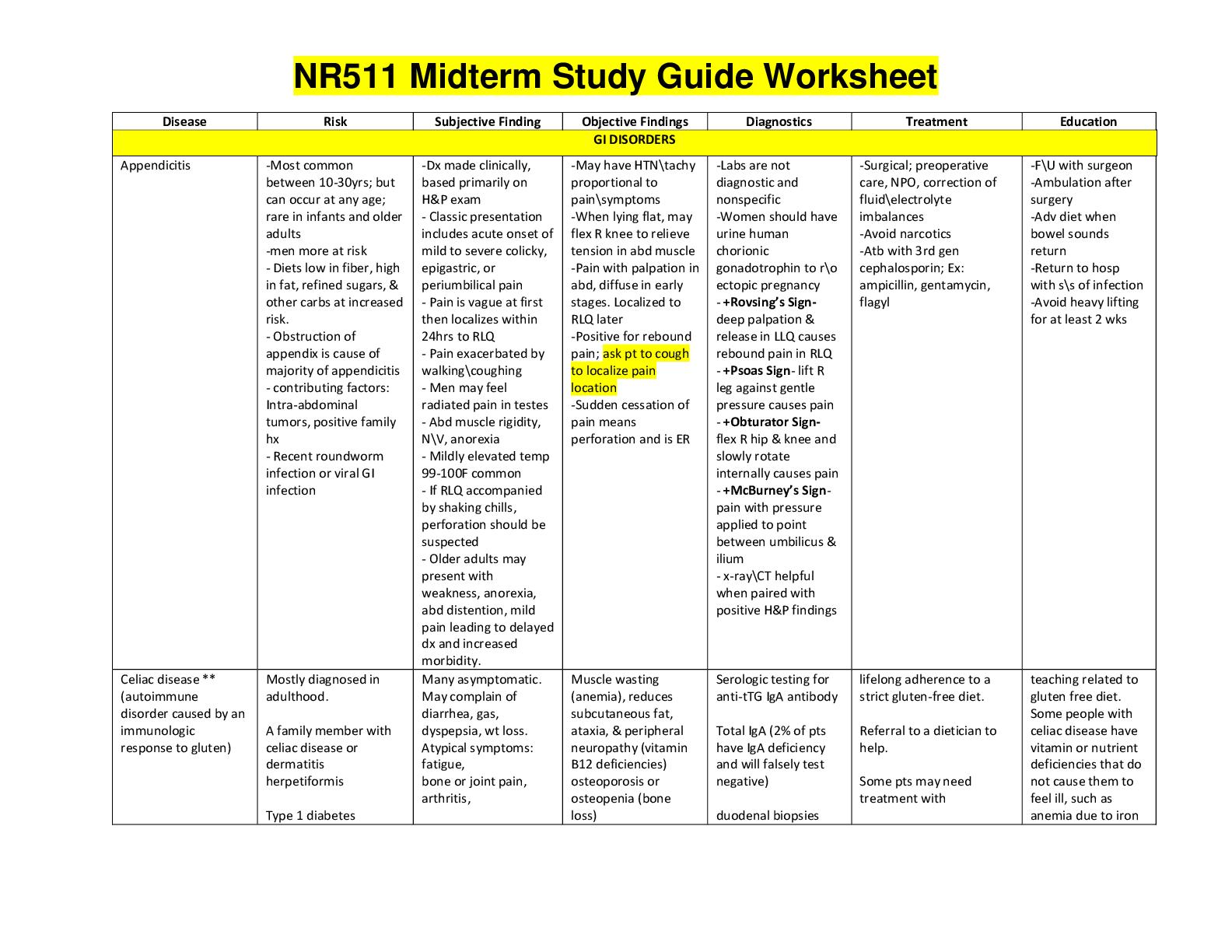
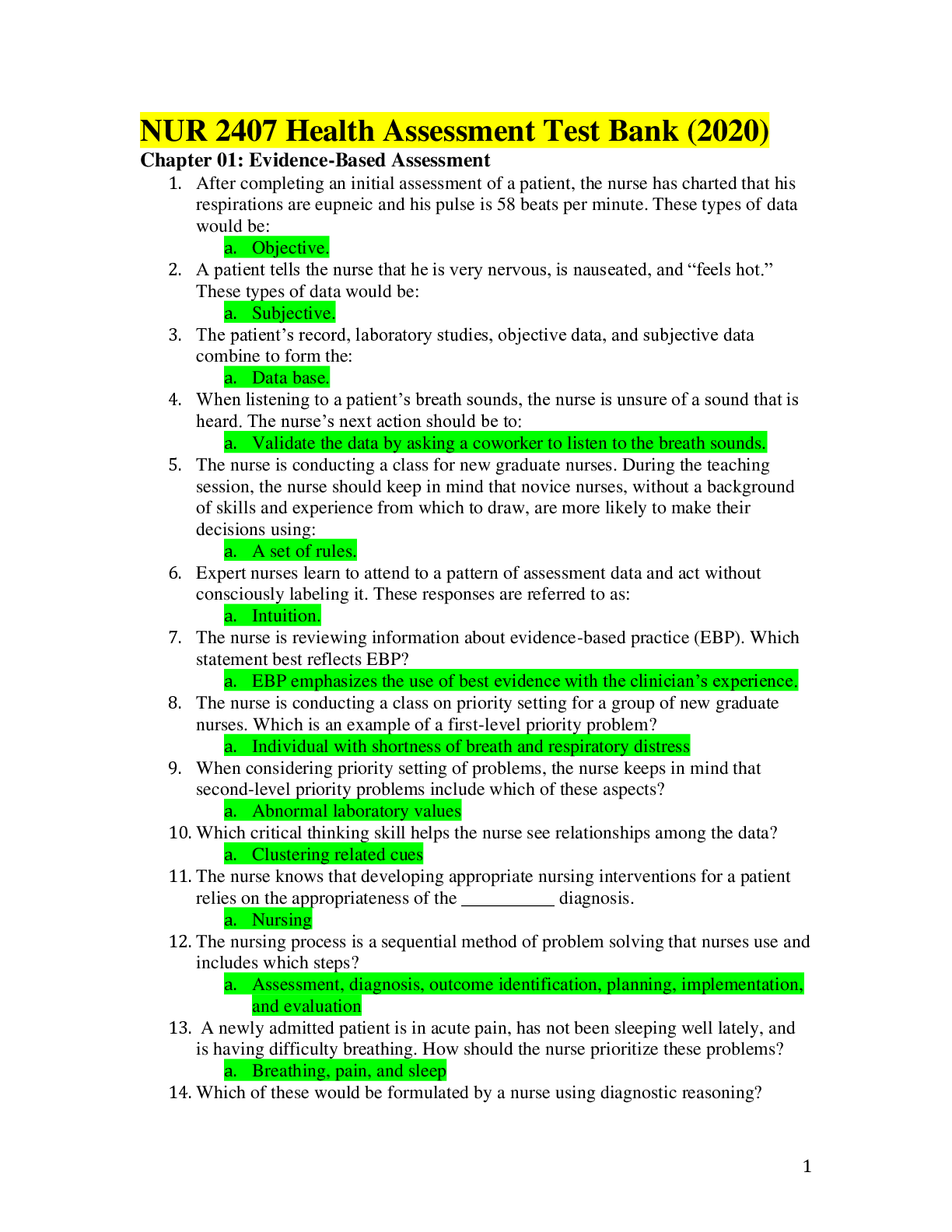

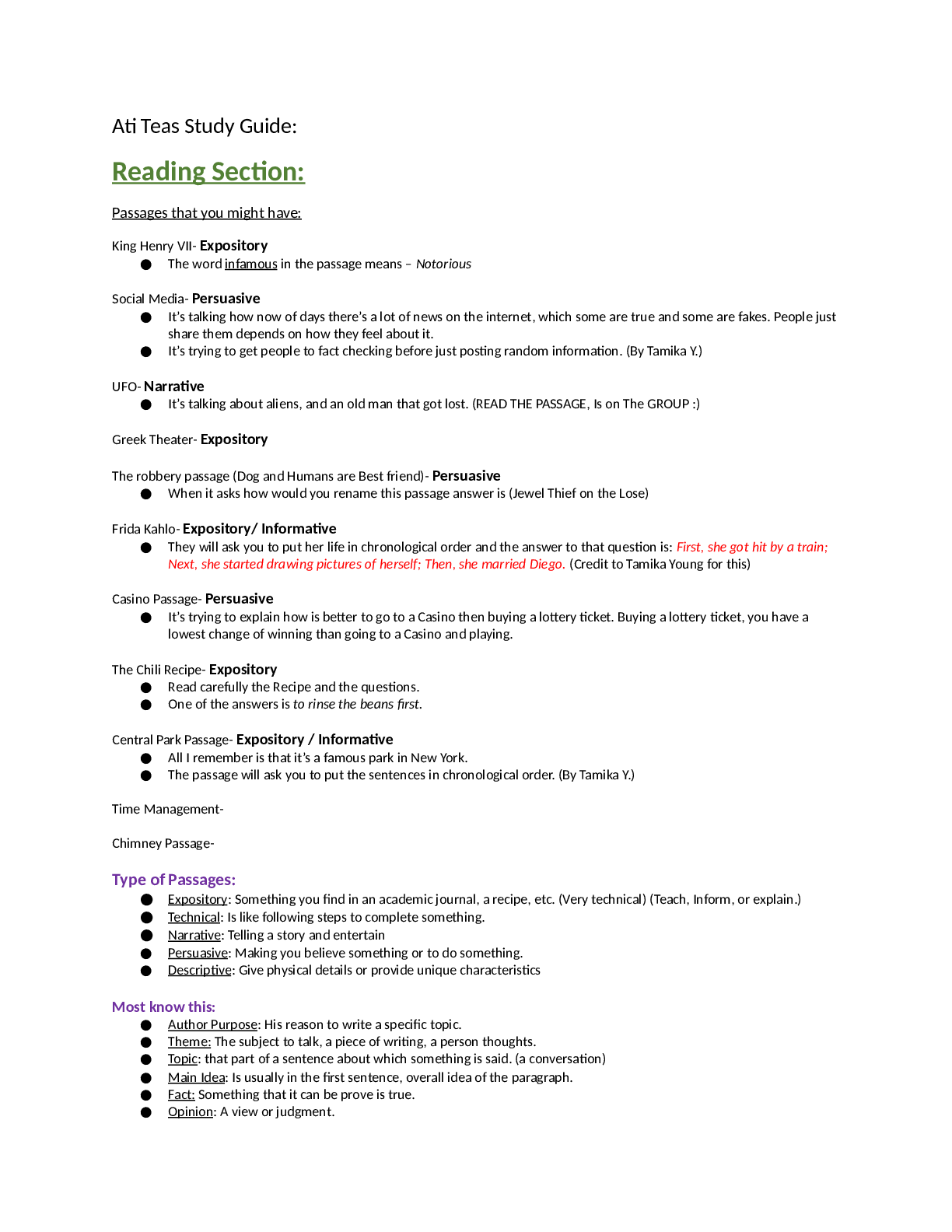
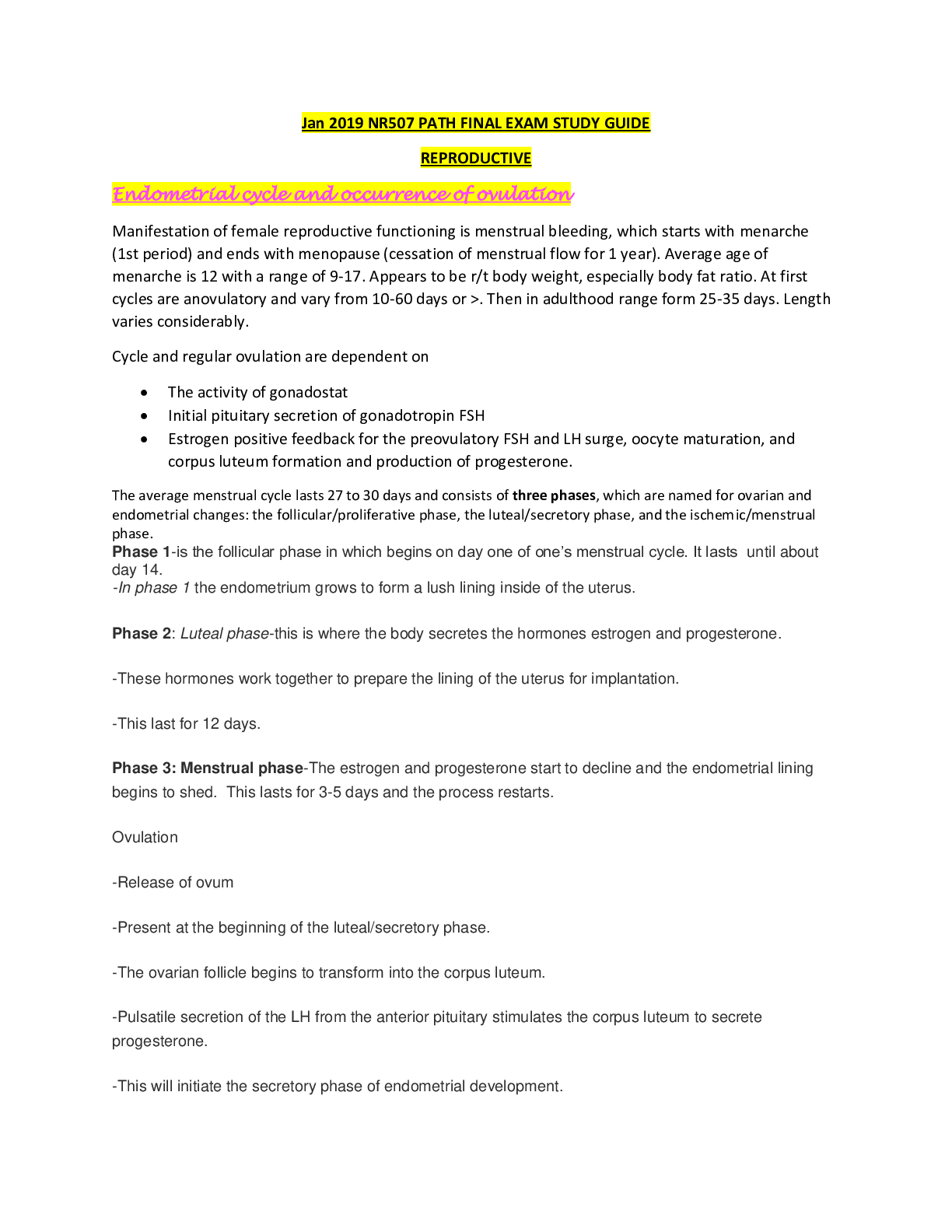

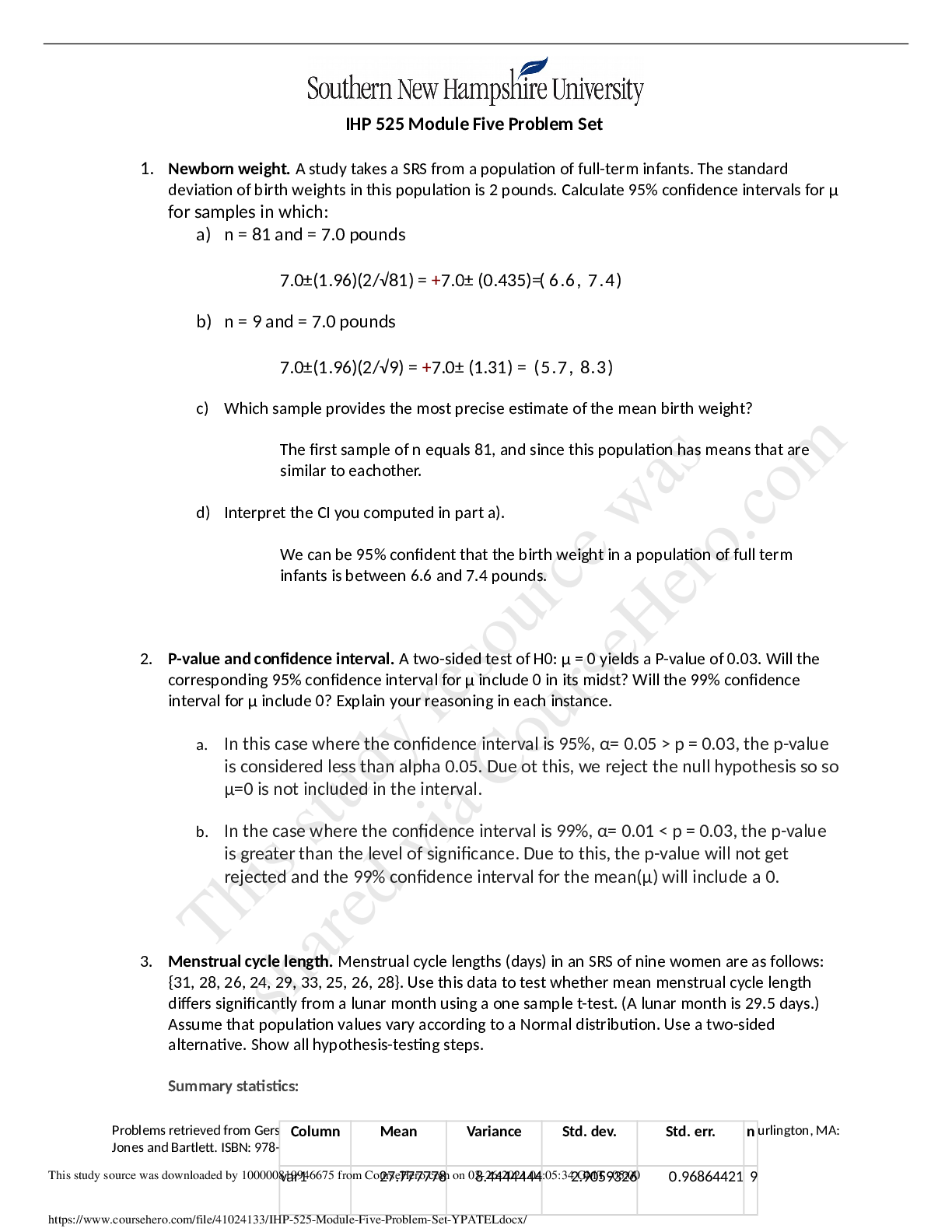

 Conveyor Belt Part 2.png)


